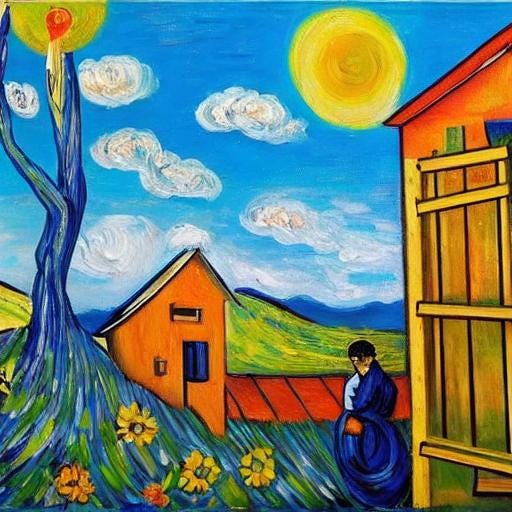How to slow down the passing of time
Where does time go and why is it always in a rush to leave? Here’s what I do.
📺 Over the holidays I appeared on the MasterChef: Battle of the Critics (UK) Christmas special where the tables were turned and rather than critiquing other people’s food (my usual role on the show), I was the one cooking and had my food critiqued by Greg Wallace, John Torode and past winners. If you have access to the BBC I do recommended watching this, it was reviewed as ‘excellent TV’ which loosely translates to: people cry. You can watch it here on BBC iPlayer.
Hi! This is Leyla from A Day Well Spent, a newsletter seeking pathways to more purposeful living.
Here’s what most recently landed in subscriber inboxes:
The 30 affirmations I say out loud, it’s these ones I write out and recite the most
Sharing our alternative Christmases and New Years, because not everyone’s looks like a shoot from a glossy magazine
An interview with the deeply enigmatic Snow Raven, a mystic and indigenous musician hailing from one of the most remote and frigid regions on the planet
Showing our appreciation for the small (silly or frivolous) things we have been grateful for this year — I have thoroughly enjoyed the responses to this!
If you’re reading this by chance — welcome! You can enter your email below to ensure you never miss my posts (most Thursdays and Sundays).
Hello everyone and a Happy New Year to you all; I hope it was joyful, peaceful and most importantly, delicious. I send these wishes from Buenos Aires where I’ve based myself for a few weeks and will remain until the end of January before heading back to London.
I’m easing myself gently into 2024 and trying to avoid the noise at this time of year. Noise about resolutions, goals, abstinence, what you should be doing, what you shouldn’t be doing, 2023 round-up reels, how to reduce your energy bills, January sales, and the rest.
If the start of 2024 has crept up on you seemingly out of nowhere and your response to the 1st of January was ‘What? Where did 2023 go? Wasn’t it summer just the other week?’, this piece is for you.
This is the first ever article I published here on A Day Well Spent, on its launch day seven months ago on 1st June. Back then the amount of readers I had was around 100 and now it’s over 3000(!), so I figure most of you haven’t read this.
It’s been behind a paywall all this time but because the turn of the year isn’t the easiest of calendar events to navigate for many — and because I’m still in a reflective and planning mode rather than a writing mode — I’ve decided to republish this and make it available for everyone to read.
This piece was recently given a shout-out by
in her wonderful musings what if… we do have time? And so if you couldn’t access it then, you can now. On the same theme, how to lengthen your life by — which includes an excerpt of Alain de Botton's "A Therapeutic Journey: Lessons from the School of Life" about the strange, slippery nature of time and how to make the most of it — is another excellent read.On the note of planning (I’m a serial planner, which I talk a bit about here) I am slightly beside myself with excitement about all the things to come to this newsletter in 2024. There are many new people here who have joined as recently as the past month or so and so this is a collective welcome to you all.
I am so looking forward to continuing writing for you all here (doing so is possibly my favourite creative outlet), further nurturing this community and getting to know you all even better down in the comments.
In a world that glorifies busyness and wealth, maybe 2024 is the year we finally begin to see our time is the greatest commodity of all.
Thank you for being here and I hope you enjoy today’s post.
How to slow down the passing of time.
I call my 91-year-old Grandmère every two weeks and in our conversations she never fails to say the same thing to me, “time is going so fast”. Every time I speak to her, it feels the sense of earnest in her voice is a little more than the time before.





